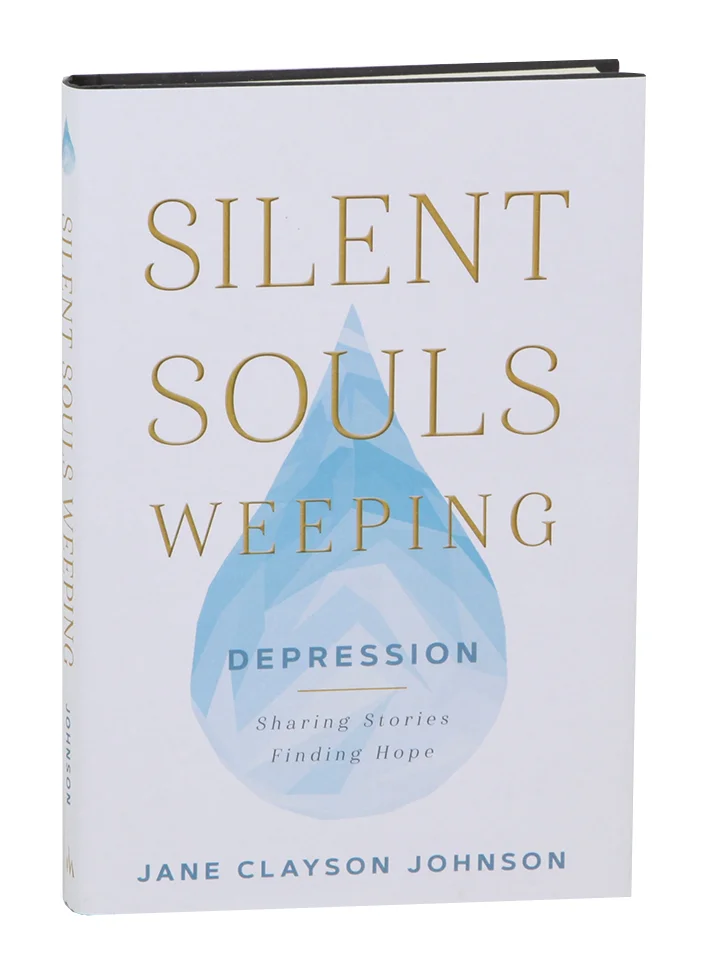Depression and the Church: Fighting the Stigma of Mental Illness
Starting a conversation
Award-winning journalist Jane Clayson Johnson, known for her work at CBS News, ABC News, and the nationally syndicated NPR program On Point, has traveled the world to tell the stories of local and international newsmakers. Today, Jane is sharing the stories of average men, women, and teens who have gone through the struggle of depression in her new book, Silent Souls Weeping.
After an unexpected and harrowing experience with her own depression, Jane started sharing her story first in just “safe places" she describes in an interview with Studio 5. She found that many others had a similar story to tell. While countless had faced this struggle, many felt they couldn’t talk about it.
Using her own story and her talents for interviewing and journalism, Jane decided to start a conversation about mental health and the stigma that often accompanies the disease. This decision led her to interview 150 men, women, and teenagers about their experiences with depression.
From teens facing pressures around them, to new moms who feel robbed of the joy that should come with a new child, to return missionaries who face the high expectations of their communities, to those afflicted with the toxic perfectionism that has increased in the social media age, Jane covers a variety of situations and types of depression. Many readers will be able to identify with one of the stories found in the book and realize that they are not alone in their feelings.
Recognizing the need for help
In an article with Deseret News, Jane says, “Miracles are possible. But let’s be clear: depression is a disease, not a spiritual deficit. When you have heart disease, you pray and you go to the cardiologist. The same principle applies to depression.”
“I think we all feel tremendous vulnerability in opening up and sharing difficult personal experiences,” she continues in the article. “It’s not easy. But another big problem is that depression has been perceived for so long as a character flaw—something we could control or overcome if we just tried harder. Clinical depression is not the result of personal inadequacy. It’s not a black mark on your character. Nobody thinks battling cancer or diabetes or heart disease is a matter of ‘pulling up your bootstraps’ and going it alone. Our whole mindset has to change. If you’re clinically depressed, you’re not going to ‘fix’ it with work and discipline.”
Destigmatizing the disease
Chapter titles throughout the book include but are not limited to “Toxic Perfectionism,” “Kidnapped Souls: Young People and Depression,” “Called to Serve, Called to Struggle: Missionaries and Depression,” and “Not just the Baby Blues: Postpartum Depression.” Readers who have found themselves in similar situations will find solidarity and realize they are not alone in their experiences and struggles. Family members of those struggling are invited into the minds of others who have gone through these trials.
Also in the article with Deseret News, Jane discusses why she is so passionate about destigmatizing depression: “Many people I interviewed believe they must have done something to cause their depression. Just imagine if we blamed people for having cancer? Or blamed ourselves for having it? One woman told me she wished she could wear a cast on her head because something is wrong in there and it’s really hard for people to understand. I’m so passionate about busting this stigma! We can’t hide these struggles anymore. Too many people are suffering in silence.”
““Miracles are possible. But let’s be clear: depression is a disease, not a spiritual deficit. When you have heart disease, you pray and you go to the cardiologist. The same principle applies to depression.” ”
Becoming a better minister
Jane concludes her book with a chapter for those who may not experience depression themselves but have a loved one they want to help. This chapter is for anyone who wants a better understanding of the mindset of someone who is experiencing depression.
The more people talk about it, the more understanding, compassion, and healing can happen. In an excerpt from the book, Jane discusses the experiences of a Latter-day Saint bishop whose experiences seeing depression in a family member have helped his own ministering in his ward, demonstrating how those in leadership and ministering positions can benefit from having a better understanding of this disease.
“We must learn to recognize the symptoms before we can gain insight into the struggles of those who are depressed,” Jane says in the book. “Dan Ellertson, a former bishop of a Salt Lake City singles ward, says he didn’t have a clue what to look for until his own son returned early from his mission due to depression.”
“Without my experience with my son, I would have been like any other bishop,” Bishop Ellertson says. “The best training we’re given is, ‘Okay, call LDS Family Services.’ But the more bishops understand, the more bishops are in a position to not react negatively or ignorantly to any situation a ward member brings to them, and the better off we’ll all be.”
You can read the rest of the excerpt on LDS Living.
““We must learn to recognize the symptoms before we can gain insight into the struggles of those who are depressed.””
In her article with Deseret News, Jane says that love is one of the best ways to help those loved ones who are experiences depression. “Love and non-judgment are our most important tools to support those who are suffering. What struck me more than anything over the last three years of working on this book is that people want to be heard. They need their experiences to be validated. The stories in this book are heartbreaking in their honesty, but also tremendously inspiring and redemptive. In every person I interviewed, I saw pain and vulnerability, but I also saw love and hope and life.”
Writing for her children
Along with her passion to destigmatize depression and share the stories of hundreds of individuals who have been affected by the mental illness, Jane wanted her own children to know how important it is to talk about mental health. She explains in her article in the Deseret News: “My children were my most compelling motivation for writing this book. I personally believe it’s a mistake—and potentially damaging—to hide mental health challenges from our kids. What’s the message we’re sending if we don’t want to talk about it? If they think we’re ashamed or that we should keep these things secret, how will they ever feel comfortable disclosing their challenges? How will they get the help they need? How will the cycle of silence and shame ever end? I talk to our kids all the time about ‘brain health’ and how our mental well-being is just as important as our physical health.”
Did you know you can listen to Jane discuss the book and her experiences in more detail on LDS Living’s podcast, All In? Listen the to the podcast now!

